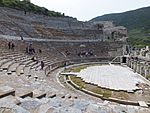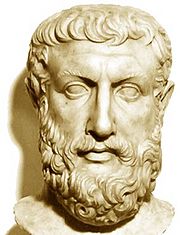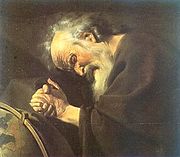Heraclitus facts for kids
Quick facts for kids
Heraclitus
|
|
|---|---|
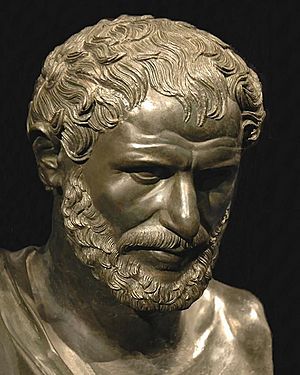
Bronze bust of Heraclitus of Ephesus, National Archaeological Museum, Naples, Italy
|
|
| Born | c. 6th century BC |
| Died | c. 5th century BC Ephesus, Ionia, Delian League
|
| Era | Pre-Socratic philosophy |
| Region | Western philosophy |
| School | Ionian |
|
Main interests
|
Nature, Soul, Cosmology, Fire |
|
Notable ideas
|
Unity of opposites, Flux |
|
Influences
|
|
|
Influenced
|
|
Heraclitus of Ephesus (/ˌhɛrəˈklaɪtəs/; Greek: Ἡράκλειτος Herákleitos, "Glory of Hera"; fl. c. 500 BC) was an ancient Greek philosopher. He lived in the city of Ephesus, which was part of the Persian Empire at the time. He is known as a "pre-Socratic" philosopher because he lived before the famous philosopher Socrates.
Not much is known for sure about Heraclitus's life. He wrote only one book, but sadly, only small pieces of it have survived. Many old stories about him are probably made up. His ideas were often puzzling, and he liked to use clever wordplay. This earned him the nickname "the obscure" (meaning hard to understand). He was also seen as someone who didn't like people much and was often sad. Because of this, he was called "the weeping philosopher." This was different from another ancient philosopher, Democritus, who was known as "the laughing philosopher."
A main idea in Heraclitus's thinking was the unity of opposites. This means that things that seem opposite are actually connected and part of the same whole. He also believed in impermanence, which means everything is always changing. He famously said, "No man ever steps in the same river twice." This idea of constant change is very different from the philosopher Parmenides, who believed that everything in the universe stayed the same.
Heraclitus's Life and Family
Most of what we know about Heraclitus comes from an ancient writer named Diogenes Laërtius. However, much of this information might not be completely true. One story says that Heraclitus gave up his family's special title of "king" to his younger brother. This suggests he came from a very rich and important family in Ephesus.
Ephesus was a powerful city in Ionia. It had connections with the kingdom of Lydia and later the Achaemenid Empire (Persian Empire). When the Ionian cities rebelled against the Persians, Ephesus was spared. This made it a very important Greek city in Ionia. Heraclitus, being from a wealthy family, didn't seem to like democracy much. But he also didn't fully support only the rich. He preferred to stay out of political fights, much like Solon in Athens.
Heraclitus is thought to have been active around 500 BC. This date might be linked to the reign of Darius the Great. There are old letters supposedly between Heraclitus and Darius, but these are now known to be fake. Still, the date is likely "roughly accurate." This is because one of his surviving writings mentions older thinkers like Pythagoras, Xenophanes, and Hecataeus. This places him around the end of the 6th century BC.
Heraclitus's Writings and Book
Heraclitus wrote just one book on papyrus, an ancient form of paper. Sadly, the full book is lost. But we have over 100 small pieces (called fragments) because other ancient writers quoted them. We don't know the book's real title, but many later thinkers called it On Nature.
Diogenes Laërtius said the book had three parts. However, this division was probably added by later thinkers, not by Heraclitus himself. We don't know much about the book's overall structure from the fragments we have. Some experts even disagree on which fragments truly belong to Heraclitus. Some scholars, like M. M. McCabe, believe that Heraclitus was able to make long arguments, not just short, wise sayings (aphorisms).
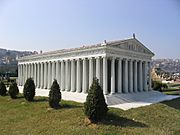
According to Diogenes Laërtius, Heraclitus placed his book in the Artemisium, a famous temple to the goddess Artemis. This was like dedicating it to the gods. The book was so famous that people who followed his ideas were called "Heracliteans." Famous Heracliteans included Cratylus.
Aristotle once quoted a part of Heraclitus's book. He pointed out how hard it was to understand because the words could be read in different ways. Another writer, Theophrastus, said parts of Heraclitus's work were "half-finished" or a "strange mix." Timon of Phlius called Heraclitus "the Riddler" because he wrote "unclearly." Timon thought Heraclitus did this on purpose, so only smart people would try to understand it. By the time of Cicero, Heraclitus was known as "The Obscure" because he wrote "too obscurely" about nature.
Ideas of Change and Opposites
A main part of Heraclitus's philosophy is the idea of flux (constant change) and the unity of opposites. Diogenes Laërtius summarized Heraclitus's ideas by saying, "All things come into being by conflict of opposites, and the sum of things flows like a stream."
Heraclitus believed that things that seem opposite are actually connected. For example, he said, "As the same thing in us is living and dead, waking and sleeping, young and old." He also said, "Cold things warm up, the hot cools off, wet becomes dry, dry becomes wet."
He thought that the world stays together because of the tension between opposites. Each opposite also contains a bit of the other. This creates a constant cycle that keeps the universe stable. Heraclitus famously said, "War is father of all and king of all." Here, "war" means the creative tension that makes things exist. He called this struggle eris (strife) and believed that dikê (justice) was a balance of it. Aristotle said Heraclitus didn't like the poet Homer. Homer wished that strife would leave the world. But Heraclitus believed that without opposites, like high and low notes in music or male and female animals, the world would be destroyed.
Jonathan Barnes notes that the famous saying "Panta rhei" (everything flows) is often linked to Heraclitus, but he probably didn't say that exact phrase. However, Plato did say that Heraclitus believed "everything moves."
The idea of constant change is often shown with the metaphor of a flowing river. Heraclitus said you cannot step into the same river twice. This idea has survived in different forms. One fragment says: "Into the same rivers we both step and do not step; we both are and are not." This suggests that not only the river is always changing, but we are too. It even hints at big questions about human existence.
The Universe and Fire
Like other early Greek philosophers from Miletus, Heraclitus believed in a basic element that everything came from. While Thales thought it was water, Anaximander thought it was something undefined, and Anaximenes thought it was air, Aristotle believed Heraclitus thought fire was this basic element.
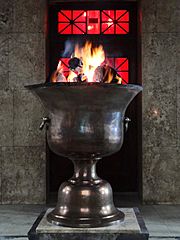
Heraclitus wrote: "This world-order [Kosmos], the same of all, no god nor man did create, but it ever was and is and will be: everliving fire, kindling in measures and being quenched in measures." He believed that everything comes from fire and returns to it in endless cycles. Heraclitus also thought the soul was a mix of fire and water. Fire was the good part, and water was the less good part. He believed that controlling one's desires helped purify the soul's fire. These constant changes explain his view that the universe "was and is and will be."
Some scholars have compared Heraclitus's ideas about fire to the practice of fire worship in Zoroastrianism, a religion from the Persian Empire. However, it's hard to say for sure if there was a direct influence. Ideas about elements changing were common in many ancient philosophies.
Heraclitus also said, Ethos anthropoi daimon, which means "man's character is his fate." This suggests that a person's luck or destiny is connected to their personality and choices.
A very important word in Heraclitus's philosophy is logos. This ancient Greek word has many meanings. Heraclitus might have used different meanings in his book. Logos seems to be a universal law that connects the whole universe. One fragment says: "Listening not to me but to the logos, it is wise to agree that all things are one." Heraclitus believed that logos is everywhere, but only a few people truly understand it. His ideas about logos later influenced the Stoics, who believed that a rational law controls the universe.
Modern scholars don't think Heraclitus meant a single God when he spoke of "God." He probably meant the divine as something different from humans, something immortal and cyclical, rather than a creator God.
Heraclitus's Influence and Legacy
Heraclitus's ideas have had a big impact on Western philosophy, including the works of Plato and Aristotle. Parmenides, another philosopher from around the same time, had ideas about an unchanging universe. Scholars debate whether Heraclitus influenced Parmenides, or vice versa, or if they developed their ideas independently.
Change and Plato's Ideas
Plato was a famous philosopher who tried to bring together the ideas of Heraclitus (constant change) and Parmenides (no change). Plato learned about Heraclitus's teachings from his follower, Cratylus. Cratylus took Heraclitus's idea even further, saying you couldn't even step into the same river once. According to Aristotle, Cratylus believed that because everything is always changing, you can't really say anything certain about the world. He supposedly just wiggled his finger instead of speaking.
Logos in Later Philosophies
The Stoics believed that many of their main ideas came from Heraclitus. This is clear in the writings of Marcus Aurelius. He understood the Logos as "the account which governs everything." However, scholars warn that the Stoics changed Heraclitus's ideas to fit their own beliefs. The Cynics were also influenced by Heraclitus.
Early Christian thinkers like Hippolytus of Rome saw Heraclitus's ideas as different from Christian beliefs. But they also linked his logos to the Christian "Word of God" found in the Bible (John 1:1). However, modern scholars believe the Christian idea of logos comes from Hebrew writings, not Greek philosophy. Another Christian writer, Justin Martyr, had a more positive view. He said that Heraclitus, like Socrates, was a "Christian before Christ" because they lived reasonably.
The Weeping Philosopher
In an ancient story by Lucian, Heraclitus is sold as the "weeping philosopher" next to Democritus, the "laughing philosopher." This idea of the weeping and laughing philosophers became popular in art during the Renaissance. It often showed their different reactions to the foolishness of people. Heraclitus also appears in Raphael's famous painting, The School of Athens.
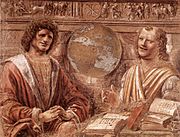
Images for kids
See also
 In Spanish: Heráclito para niños
In Spanish: Heráclito para niños
 | Shirley Ann Jackson |
 | Garett Morgan |
 | J. Ernest Wilkins Jr. |
 | Elijah McCoy |


